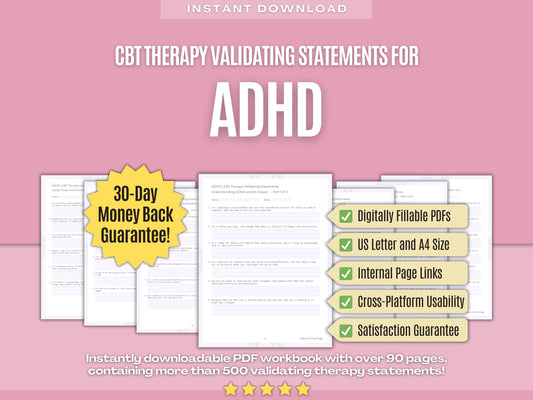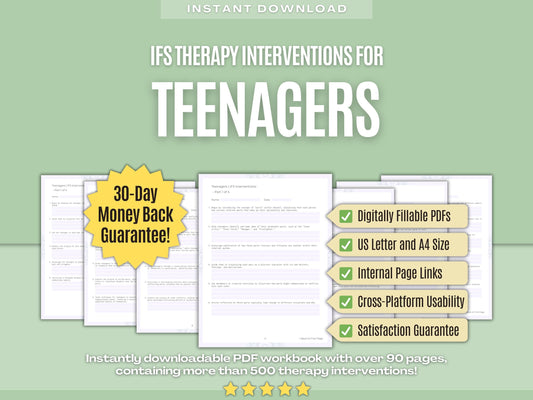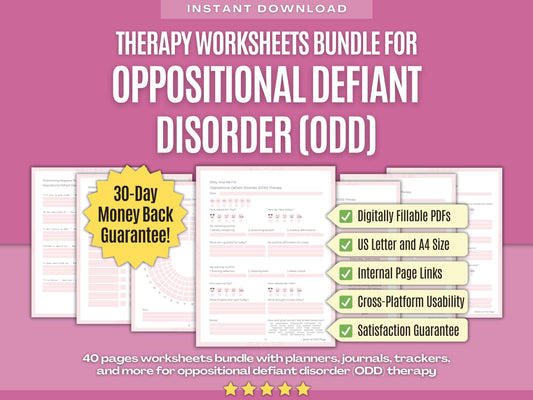Elevate Your Therapy and Guide Your Clients to Inner Healing with Our Anorexia Therapy Progress Notes! ✨
1. Beginning Anorexia Therapy
- Today marked the commencement of our work together in addressing your anorexia nervosa.
- I conducted a review of your progress since our last session, focusing on any changes in symptoms or behaviors.
- I provided validation and positive reinforcement for any progress or achievements you've made so far.
- I introduced psychoeducation on the role of maladaptive thoughts and beliefs in perpetuating anorexic behaviors.
- I introduced cognitive restructuring techniques to help challenge and modify these maladaptive thoughts.
- I provided an overview of the importance of establishing a regular eating pattern and balanced nutrition in recovery.
- I introduced the concept of exposure therapy and discussed its potential role in desensitizing fear foods or situations.
- I provided psychoeducation on the physical and emotional consequences of excessive exercise in individuals with anorexia.
- I introduced mindfulness techniques to help increase present-moment awareness and reduce automatic responses to triggers.
- I assessed your progress in utilizing self-monitoring tools to track thoughts, emotions, and behaviors related to your eating disorder.
- I encouraged you to continue utilizing coping strategies learned in therapy between sessions and to practice self-compassion during difficult moments.
Need more? Find all 500+ Therapy Progress Notes for Anorexia Therapy in our Digital Workbook!
2. Anorexia Psychoeducation
- Today's session focused on providing psychoeducation about anorexia nervosa to deepen your understanding of the disorder.
- I explained the prevalence of anorexia nervosa and its impact on individuals across various demographics.
- I provided information about the physical health consequences of anorexia nervosa, emphasizing the importance of early intervention and treatment.
- I addressed common misconceptions and myths surrounding anorexia nervosa, including stereotypes about body image and eating disorders.
- I discussed the potential complications and long-term consequences of untreated anorexia nervosa, including nutritional deficiencies, organ damage, and increased mortality risk.
- I introduced the biopsychosocial model of anorexia nervosa, which considers the interaction of biological, psychological, and social factors in the development and maintenance of the disorder.
- I provided information about the various treatment approaches for anorexia nervosa, including individual therapy, family therapy, nutritional counseling, and medication management.
- I discussed the importance of a multidisciplinary treatment team, including therapists, physicians, dietitians, and other healthcare professionals, in providing comprehensive care for individuals with anorexia nervosa.
- I provided information about the process of recovery from anorexia nervosa, emphasizing that it is possible with dedication, support, and professional guidance.
- I addressed the stigma associated with anorexia nervosa and encouraged you to seek support and resources without shame or judgment.
- I provided resources and referrals for additional support services, including support groups, online forums, and community organizations specializing in eating disorder recovery.
Need more? Find all 500+ Therapy Progress Notes for Anorexia Therapy in our Digital Workbook!
3. Mindfulness for Eating Disorders
- Today's session centered around the practice of mindfulness as a therapeutic approach for managing eating disorders, particularly anorexia nervosa.
- I explained the relevance of mindfulness in the context of eating disorders, highlighting its potential to cultivate awareness of thoughts, emotions, and behaviors related to food and body image.
- I introduced mindfulness techniques, such as mindful eating, body scan meditation, and mindful breathing, as tools for fostering a more balanced relationship with food and body.
- I provided guidance on incorporating mindfulness into daily routines, including meal times, moments of stress, and self-care activities.
- I introduced the concept of urge surfing, a mindfulness-based technique for navigating cravings and urges to engage in unhealthy eating patterns.
- I emphasized the importance of regular mindfulness practice in strengthening neural pathways associated with self-regulation and impulse control.
- I provided resources and recommendations for mindfulness-based interventions, such as mindfulness-based stress reduction (MBSR) programs or guided meditation apps.
- I encouraged you to approach mindfulness with a spirit of curiosity and experimentation, recognizing that progress may come gradually with consistent practice.
- I encouraged you to integrate mindfulness into your daily life outside of therapy sessions and to observe any changes in your relationship with food and body image.
- I provided psychoeducation on the neuroscience of mindfulness, explaining how mindfulness practices can promote neuroplasticity and rewiring of the brain.
- I encouraged you to practice self-compassion in moments of struggle or setback, recognizing that healing from anorexia nervosa is a journey with ups and downs.
Need more? Find all 500+ Therapy Progress Notes for Anorexia Therapy in our Digital Workbook!
4. Dialectical Behavior Therapy (DBT) for Emotional Regulation
- Today's session focused on introducing dialectical behavior therapy (DBT) as a treatment approach for anorexia nervosa, specifically emphasizing emotional regulation skills.
- I provided psychoeducation on the emotion regulation module of DBT, which aims to help individuals identify, understand, and manage their emotions more effectively.
- I introduced the skill of mindfulness as a foundational practice for increasing awareness of emotions and developing a nonjudgmental stance towards them.
- I introduced the skill of emotion awareness, which involves identifying and labeling emotions as a first step towards regulation.
- I introduced the skill of opposite action, which involves acting opposite to the urges associated with intense or distressing emotions to change their trajectory.
- I discussed the concept of checking the facts, which involves examining the evidence for and against the validity of one's emotions and interpretations of events.
- I introduced the skill of problem-solving, which involves breaking down overwhelming situations into manageable components and developing effective strategies for resolution.
- I introduced the skill of PLEASE MASTER, which focuses on prioritizing self-care activities to enhance emotional regulation.
- I introduced the skill of radical acceptance, which involves acknowledging and accepting reality as it is, even when it's painful or difficult.
- I introduced the skill of pros and cons, which involves weighing the advantages and disadvantages of different courses of action to make informed decisions.
- I encouraged you to practice DBT skills outside of therapy sessions and to monitor your progress using diary cards or other self-monitoring tools.
Need more? Find all 500+ Therapy Progress Notes for Anorexia Therapy in our Digital Workbook!
5. Interpersonal Therapy (IPT) for Relationship Issues
- Today's session focused on introducing interpersonal therapy (IPT) as a treatment approach for addressing relationship issues related to anorexia nervosa.
- I provided psychoeducation on the four interpersonal problem areas targeted in IPT: grief, role transitions, interpersonal disputes, and interpersonal deficits.
- I introduced the concept of role transitions, such as entering adolescence or transitioning to adulthood, and how these transitions can influence your relationship with yourself and others.
- I addressed interpersonal disputes, which involve conflicts or tensions in relationships that contribute to distress and maladaptive coping strategies.
- I introduced strategies for resolving interpersonal disputes, including communication skills, assertiveness training, and problem-solving techniques.
- I addressed interpersonal deficits, which refer to difficulties in forming and maintaining meaningful connections with others.
- I introduced techniques for improving interpersonal skills, such as active listening, empathy, and building social support networks.
- I encouraged you to reflect on your past and current relationships, identifying strengths and areas for growth in interpersonal interactions.
- I provided validation and empathy for your experiences with anorexia nervosa and the challenges you face in navigating interpersonal relationships.
- I introduced the concept of communication patterns and how they can impact the quality of relationships, particularly in the context of anorexia nervosa.
- I encouraged you to practice assertiveness and communication skills outside of therapy sessions, gradually applying them to your interactions with others.
Need more? Find all 500+ Therapy Progress Notes for Anorexia Therapy in our Digital Workbook!
6. Emotion-Focused Therapy (EFT) for Anorexia
- Today's session focused on introducing emotion-focused therapy (EFT) as a treatment approach for individuals struggling with anorexia nervosa.
- I provided psychoeducation on the role of emotions in anorexia nervosa, highlighting how difficulties in emotion regulation can contribute to disordered eating behaviors and body image concerns.
- I introduced the concept of emotional awareness, which involves recognizing, labeling, and accepting one's emotions without judgment.
- I addressed the role of emotional processing in EFT, which involves exploring the underlying emotions and meanings associated with anorexic symptoms and behaviors.
- I encouraged you to explore the function and purpose of your anorexic symptoms, recognizing them as attempts to cope with underlying emotional pain or distress.
- I introduced techniques for interrupting and restructuring maladaptive emotion cycles, such as emotion regulation skills, emotion processing, and validation.
- I addressed the concept of emotional validation in EFT, which involves acknowledging and accepting one's emotions as valid and understandable responses to internal and external experiences.
- I encouraged you to cultivate self-compassion and kindness towards yourself, especially when experiencing difficult emotions related to anorexia nervosa.
- I provided guidance on assertive communication skills and setting boundaries in relationships to promote emotional expression and connection.
- I encouraged you to reflect on your experiences in therapy and to share any thoughts, feelings, or concerns that arise during our sessions.
- I reassured you that progress in EFT is achievable with dedication and effort, and that setbacks are a normal part of the therapeutic process.
Need more? Find all 500+ Therapy Progress Notes for Anorexia Therapy in our Digital Workbook!
7. Psychodynamic Approaches to Eating Disorders
- Today's session delved into psychodynamic approaches to understanding and treating eating disorders, particularly anorexia nervosa.
- I provided psychoeducation on key psychodynamic concepts, such as defense mechanisms, object relations, and the role of the ego in mediating internal and external demands.
- I addressed the concept of object relations theory, which examines how individuals internalize and relate to others based on early attachment experiences.
- I introduced the concept of ego defenses, which are unconscious strategies individuals use to protect themselves from anxiety or emotional distress.
- I addressed the concept of the eating disorder as a symbolic expression of deeper emotional struggles and unmet needs.
- I encouraged you to explore your relationship with food and your body, recognizing them as avenues for expressing and coping with complex emotional experiences.
- I provided validation and empathy for your experiences with anorexia nervosa, acknowledging the pain, confusion, and ambivalence you may be experiencing.
- I introduced the concept of the therapeutic relationship as a vehicle for exploring and resolving unconscious conflicts and relational patterns.
- I encouraged you to reflect on your past and current relationships, identifying patterns of interaction and attachment that may contribute to your struggles with anorexia nervosa.
- I addressed the concept of resistance in psychodynamic therapy, which may manifest as avoidance, defensiveness, or reluctance to explore certain topics or emotions.
- I reassured you that progress in psychodynamic therapy is achievable with patience, curiosity, and a willingness to explore difficult emotions and experiences.
Need more? Find all 500+ Therapy Progress Notes for Anorexia Therapy in our Digital Workbook!
8. Music Therapy for Emotional Healing
- Today, the client engaged enthusiastically in our music therapy session, demonstrating a willingness to explore emotions through various musical activities.
- During the session, the client verbalized a sense of empowerment while playing a musical instrument, indicating progress in building self-esteem.
- The client demonstrated improved emotional expression through songwriting, using lyrics to articulate feelings and experiences related to their eating disorder.
- The client identified specific emotions triggered by certain musical pieces, allowing for deeper exploration of underlying issues related to their eating disorder.
- The client practiced mindfulness while listening to music, focusing on the present moment and letting go of negative thoughts surrounding body image.
- The client experimented with different genres of music to identify those that evoke positive emotions and promote relaxation.
- The client shared insights gained from listening to music outside of therapy sessions, indicating an increased awareness of their emotional triggers.
- The client practiced self-expression through music by creating playlists that reflect their emotional journey in recovery from anorexia.
- The client demonstrated improved emotional regulation skills through engaging in music-based relaxation techniques.
- The client identified specific songs that evoke memories of challenging times in their recovery journey, facilitating discussions around resilience and progress.
- The client reflected on their emotional responses during musical improvisation, gaining insight into underlying feelings and thought patterns.
Need more? Find all 500+ Therapy Progress Notes for Anorexia Therapy in our Digital Workbook!
9. Wrapping Up Therapy Sessions
- Today's session marked the conclusion of our therapeutic journey together, as we wrapped up our work on addressing the client's anorexia.
- The client shared insights gained from therapy, expressing gratitude for the support and guidance received during their healing process.
- The client reflected on the challenges they faced during treatment, recognizing moments of struggle and learning opportunities.
- The client expressed a sense of readiness to transition out of therapy, feeling confident in their ability to navigate challenges independently.
- The client identified their support network and discussed plans for seeking support if needed after concluding therapy.
- The client expressed optimism about their future and a renewed sense of hope for living a fulfilling life free from the constraints of their eating disorder.
- The client reflected on their evolving relationship with food and body image, noting shifts in perspective and attitudes over the course of therapy.
- The client expressed a sense of closure and resolution regarding their therapeutic goals, feeling prepared to move forward with newfound insight and confidence.
- The client expressed appreciation for the therapeutic alliance formed during our sessions, highlighting the impact of our collaborative work.
- The client reflected on the personal growth experienced throughout therapy, recognizing changes in their mindset, behavior, and relationships.
- The client expressed a commitment to practicing self-compassion and acceptance as they continue their journey towards recovery.
Need more? Find all 500+ Therapy Progress Notes for Anorexia Therapy in our Digital Workbook!
10. Reflecting on Anorexia Therapy Journey
- Today, the client expressed a greater awareness of the emotional triggers that lead to restrictive eating patterns.
- The client demonstrated improved insight into the connection between self-worth and body image, recognizing the need for self-compassion.
- The client reflected on their journey towards establishing healthier eating habits and embracing a balanced approach to nutrition.
- Today, the client shared insights into the impact of societal pressures on body image and self-esteem.
- The client expressed a growing sense of empowerment in making autonomous choices regarding food and nourishment.
- Today's session focused on enhancing the client's assertiveness skills in advocating for their own needs and boundaries.
- We explored the client's progress in cultivating a more positive self-image and fostering self-acceptance.
- The client expressed a deeper understanding of the link between emotional regulation and disordered eating patterns.
- Today, the client shared insights into the role of perfectionism in perpetuating anorexic behaviors and explored strategies for self-compassion.
- The client reflected on the impact of anorexia on interpersonal relationships and explored ways to rebuild trust and connection.
- We discussed the client's progress in developing healthy coping mechanisms for managing stress and emotional triggers.
We hope that our therapy progress notes for Anorexia therapy will help you to elevate your therapy practice and guide your clients to inner healing! Do you need more therapy progress notes for Anorexia therapy? Find them all in our Digital Workbook! Or do you have any questions or suggestions for us? Please feel free to contact us at any time!


















